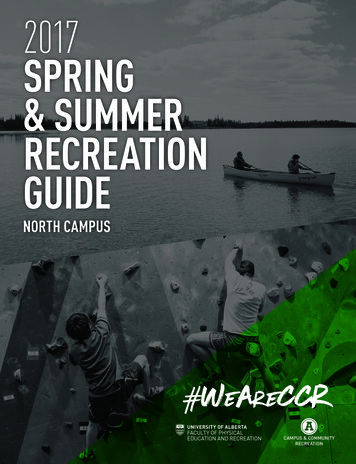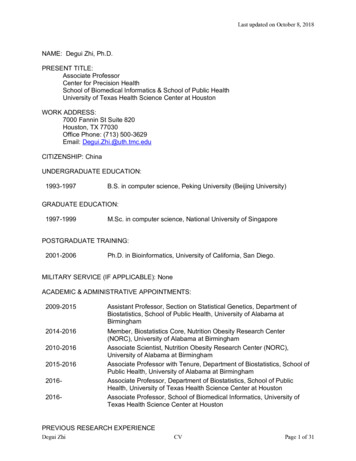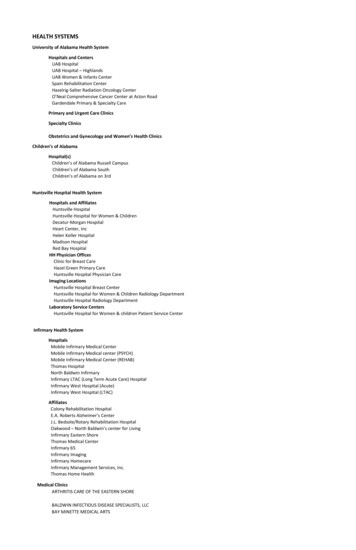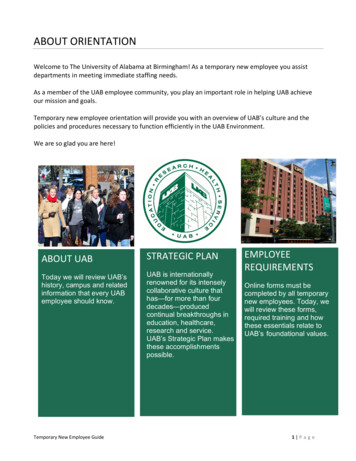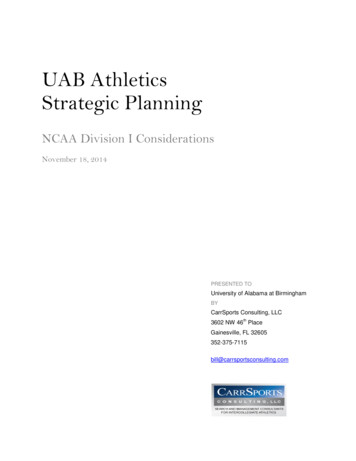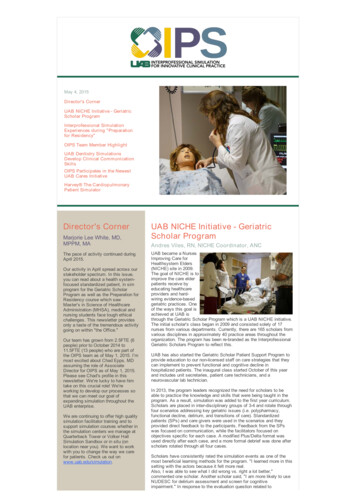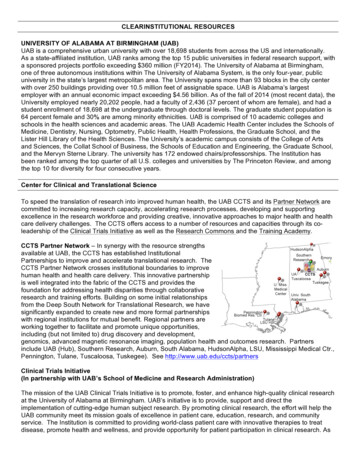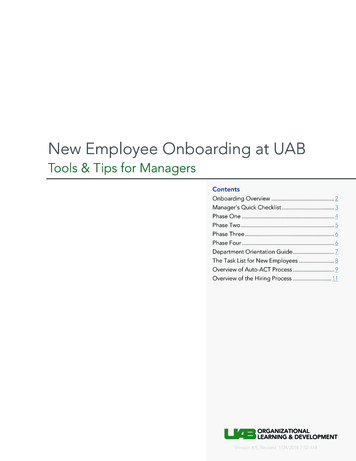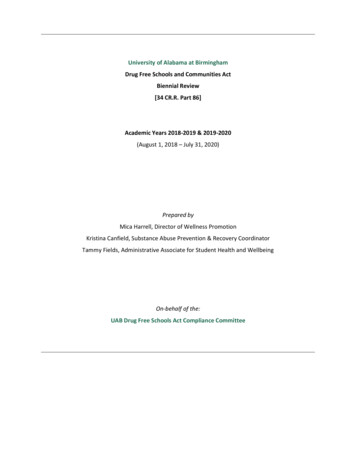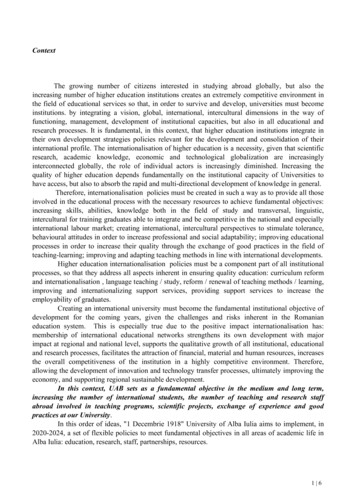
Transcription
ContextThe growing number of citizens interested in studying abroad globally, but also theincreasing number of higher education institutions creates an extremely competitive environment inthe field of educational services so that, in order to survive and develop, universities must becomeinstitutions. by integrating a vision, global, international, intercultural dimensions in the way offunctioning, management, development of institutional capacities, but also in all educational andresearch processes. It is fundamental, in this context, that higher education institutions integrate intheir own development strategies policies relevant for the development and consolidation of theirinternational profile. The internationalisation of higher education is a necessity, given that scientificresearch, academic knowledge, economic and technological globalization are increasinglyinterconnected globally, the role of individual actors is increasingly diminished. Increasing thequality of higher education depends fundamentally on the institutional capacity of Universities tohave access, but also to absorb the rapid and multi-directional development of knowledge in general.Therefore, internationalisation policies must be created in such a way as to provide all thoseinvolved in the educational process with the necessary resources to achieve fundamental objectives:increasing skills, abilities, knowledge both in the field of study and transversal, linguistic,intercultural for training graduates able to integrate and be competitive in the national and especiallyinternational labour market; creating international, intercultural perspectives to stimulate tolerance,behavioural attitudes in order to increase professional and social adaptability; improving educationalprocesses in order to increase their quality through the exchange of good practices in the field ofteaching-learning; improving and adapting teaching methods in line with international developments.Higher education internationalisation policies must be a component part of all institutionalprocesses, so that they address all aspects inherent in ensuring quality education: curriculum reformand internationalisation , language teaching / study, reform / renewal of teaching methods / learning,improving and internationalizing support services, providing support services to increase theemployability of graduates.Creating an international university must become the fundamental institutional objective ofdevelopment for the coming years, given the challenges and risks inherent in the Romanianeducation system. This is especially true due to the positive impact internationalisation has:membership of international educational networks strengthens its own development with majorimpact at regional and national level, supports the qualitative growth of all institutional, educationaland research processes, facilitates the attraction of financial, material and human resources, increasesthe overall competitiveness of the institution in a highly competitive environment. Therefore,allowing the development of innovation and technology transfer processes, ultimately improving theeconomy, and supporting regional sustainable development.In this context, UAB sets as a fundamental objective in the medium and long term,increasing the number of international students, the number of teaching and research staffabroad involved in teaching programs, scientific projects, exchange of experience and goodpractices at our University.In this order of ideas, "1 Decembrie 1918" University of Alba Iulia aims to implement, in2020-2024, a set of flexible policies to meet fundamental objectives in all areas of academic life inAlba Iulia: education, research, staff, partnerships, resources.1 6
I. EducationThe university must assume, locally and regionally, the role of promoter of innovation,technology transfer, dynamic integration of the community in the European competitive cultural andeconomic environment. It also needs to meet the expectations of actors in the labour market,representing increasingly diverse economic fields and international economic activity. The trainingof graduates to support these institutional roles, enabling the University to be the main pole ofregional sustainable development, means ensuring for the institution's students a quality, innovativeand modern education, access to knowledge and state-of-the-art technologies through a reformed andpar excellence international curriculum, an intercultural and diverse academic environment, tolerant,adaptable and open. For this, UAB will seek to provide its graduates with skills, competencies,global, intercultural knowledge, through: Curricular reform for the development of a curriculum and a pedagogy aimed at thedevelopment of global competences; Development of new educational programs, especially at the level of the 2nd cycle ofstudy - master, in English for relevant fields at regional, national and internationallevel: law, computer science, exact sciences and engineering, sustainabledevelopment and renewable energy, etc. Encouraging academic mobility and automatic recognition of transferable creditsobtained as a result of study mobility carried out at academic partners abroad; Academic recognition of learning outcomes solely on the basis of skills, abilities andknowledge acquired, in accordance with the ECTS Guide and the relevant principlesof international mobility programs; Integration in the curriculum of bachelor's, master's and doctoral programs ofcompulsory internships or study courses at UAB partners abroad for at least oneacademic semester, where this is possible and desirable, in accordance withcompetitive market expectations of labour force; Identification of new international, academic and labour market partners, for theimplementation of training / internship / placement programs for UAB students andacademic recognition of the results obtained by them by quantifying them in theECTS system; Implementation of dual study programs for specializations in the field of humanities,social sciences, kinesiology/physical therapy, computer science, engineering, etc.,funded by European projects in the field of education to encourage consecutivestudy of UAB students at the partner abroad and vice versa for a semester or for oneacademic year, during a complete study cycle; Diversification of teaching / learning methods by organizing seminars, workshops,online courses organized with academic, institutional partners, companies, nongovernmental organizations on the labour market, socially and culturally active andtheir integration in the elective/optional packages of curriculum, or their recognitionin the Diploma Supplements, with the number of ECTS credits awarded; Integration of students in international, social, cultural research projects, internationalsports projects, including by encouraging networking between organizations, circles,student clubs with relevant international partners; Creating various cultural, social, educational opportunities for the integration ofstudents in all aspects of academic life, together with the international students of theinstitution.2 6
II. ResearchReforming the curriculum to meet the real needs of the global society in which we operate isinevitably linked to research-innovation-development and the transfer of this knowledge to real lifesituations. Research must guide excellence in academic activity, encourage creativity, innovation,and meet the needs and expectations of stakeholders in the labour market, in the real economy,support the multiplication of human, economic, material, cultural and civil resources. The sustainabledevelopment of "1 Decembrie 1918" University of Alba Iulia can be achieved by investing allavailable institutional resources to encourage high quality scientific research and by accessingmultiple European and global funding opportunities to support it financially. In the current globalcontext, scientific research can only be anchored in an international context. In this direction, UABwill pursue its objectives by: Expanding strategic partnerships with prestigious international institutions(Universities, Institutes, research centres), which would allow the development of newprojects in the field of research-innovation-development; Operationalization / internationalisation and consolidation of the activity of researchand technology transfer centres, including by encouraging accession to similarinternational bodies or within international academic partners; Encouraging the participation in conferences, international congresses of teaching andresearch staff, financed by accessing the funds available at national, European andinternational level for research-development-innovation; Ensuring the material and human resources and the institutional support necessary toobtain funding through the HORIZON program, for top research; Encouraging the publication/establishment of journals with scientific content, ratedaccording to the highest international standards, in partnership with internationaluniversities, institutes / research centres; Concluding cross-border partnerships with prestigious companies, in order toencourage research-innovation-development activities; Encouraging individual initiatives in drafting research projects in partnership withinternational teachers and researchers to develop stable partnerships. Supporting UAB teachers and researchers in establishing academic contacts anddeveloping research projects in partnership with teachers and researchers from otherhigher education institutions and research institutes based on compatibility oraffinities on the same topic or scientific field. Inviting internationally recognized experts, high quality staff, academics, research orspecialists from private companies in various economic fields to teach courses,seminars, workshops, in specific visiting professor programs or using national orinternational funding sources; Encouraging the academic mobility of teachers and researchers for training inlaboratories, research and technology transfer centres, for specific and relevantprojects and the recognition of the results obtained after their performance,specifically in the annual evaluations and on specific payroll grids; Encourage mobility for teacher training, including through visiting professorprograms and publication, dissemination of their results and relevant recognition ofthese activities in annual evaluations and on specific payroll grids.3 6
III. StaffWithin UAB, the Centre for International Relations assumes the mission of substantiating,developing and applying them in the context of expanding the European and international academicspace. However, the construction of an organizational culture anchored in promoting diversity,recognizing the overwhelming importance of the plurality and multiculturalism of the internationalacademic space, open to the global horizons of higher education requires promoting a personnelpolicy commensurate with the objectives set by the University. In order to ensure the humanresources necessary to implement the medium and long-term objectives of UAB in the field ofinternationalisation, we will pursue: Coordination of policies that support the goal of UAB internationalisation by a vicerector appointed for internationalisation policies and international relations; Strengthening the institutional capacity of the Centre for International Relations byensuring the annual training courses for CRI employees, by reforming the normativeframework and the operational procedures regarding its activity in order to make theworking tools more flexible; Strengthening the cooperation between faculties and academic and administrativedepartments of the institution in order to ensure the unitary implementation ofinternationalisation policies by systematizing and extending the attributions ofErasmus coordinators by faculties, departments or specializations and transformingthem into coordinating positions for international relations within faculties, academicdepartments or for study programs; Ensuring the professional training of teachers and researchers in order to acquire,where appropriate, language skills in languages of international circulation, includingby ensuring access to language courses in the virtual environment; Ensuring the necessary resources for the lifelong learning of academic and researchstaff by promoting international mobility for teaching and training; Organizing conferences, seminars, internal, national and international trainingworkshops on internationalisation, curricular reform, international research,intercultural communication, etc.; Ensuring the necessary resources for the lifelong learning process for the employeesof the administrative structures of UAB in order to ensure linguistic, intercultural,management and quality assurance skills to support, develop and consolidate theinternational organizational culture of UAB, including through mobility programsimplemented at UAB; Realization and implementation of programs, methodologies, strategies regarding theattraction of international know-how within UAB by providing the necessaryresources for visiting professor projects, language lectureships or in other fields ofinterest, courses and / or seminars lectured by teachers from abroad, experts fromcompanies or research institutes, including online or by implementing the principle ofreciprocity within the cooperation agreements; Ensuring a competitive, fair, non-discriminatory and open framework in theprofessional evaluation of UAB staff, including in this process substantial indicatorson the activities carried out in order to achieve the strategic objectives of UAB in thefield of internationalisation.4 6
IV. PartnershipsThe strategic vision that guides the entire activity of the Centre for International Relationsstarts from the premise that the internationalisation of higher education is not an end in itself, butrepresents a resource with multiple values for developing and increasing the competitiveness of theinstitution, in order to achieve strategic objectives: increasing the quality of education and research,increasing the international visibility of UAB, improving the skills of graduates to ensure their easyintegration into the global labour market, creating a European/international profile of beneficiaries ofeducational processes, UAB integration in the local, European and global community. Inimplementing the specific policies needed to achieve these institutional goals, it is particularlyimportant to pay close attention to UAB's national, European and international partnerships, given: Strengthening the strategic partnerships that the University currently has, especiallythrough the operationalization and development of UNIRO; Creating new strategic partnerships to ensure UAB's presence in all relevant regionsof the globe, as defined by the EACEA; Providing resources and strategies for improving partnerships with European highereducation institutions in order to join a network/consortium to apply for EC European University projects; Expanding and strengthening cooperation with institutions in the immediate vicinityof Romania and in countries with the Romanian diaspora; Concluding at least 3 partnerships/cooperation agreements for each educationalprogram in the UAB portfolio, mainly for the exchange of good practices in the fieldof education-research-innovation, visiting professor programs, lectureships for specialcourses/seminars integrated in the elective curriculum on the basis of reciprocity; Expanding, consolidating, operationalizing partnerships for cooperation ininternational mobility programs; Concluding, operationalizing partnerships with higher education institutions abroadfor the organization of at least one international summer school annually; Expanding the cooperation with the diplomatic representations present in Romania inorder to organize courses, workshops, international exchange of know-how,participation in fairs or promotional events, development of new study programs, etc; Intensifying the efforts regarding the cooperation with cultural institutions fromabroad represented in Romania through cultural institutes or centres.V. ResourcesThe policies of internationalisation of higher education do not represent a trend and a goal initself, as we have shown above, but a vital response of the Universities in front of the challenges andcomplexity of the globalization of higher education. They respond to the needs of sustainabledevelopment of society by transforming educational institutions into its resources. Of course, withinthe broad framework of European, national and local institutional internationalisation policies,relevant strategies are developed for this process that identify important resources necessary totransform universities into global actors, UAB will make the necessary efforts to ensure them: Identifying national and international sources for financing the development ofinstitutional capacity in the field of internationalisation and making efforts to attractsuch funding by implementing relevant projects;5 6
Strengthening local, regional and national partnerships in order to ensure human,material and/or financial resources for the international promotion of UAB's activitiesand the importance of our University at local, regional and national level;Strengthening cooperation with research – innovation - development centres,international cultural centres and institutes in order to access the opportunities offeredby them to improve the educational offer, students' access to research projects orprofessional internship.This strategic document will be carried out through sectoral policy proposals for all 5chapters, including performance indicators and expected outcomes, submitted for approval to theUniversity Senate within 6 months from the approval of the internationalisation strategy for 20202024. The sectoral policy documents will be drafted under the coordination of the Vice-Rector III ofUAB by the Centre for International Relations in collaboration with all the academic andadministrative structures of the university.Approved in the Senate Meeting of the "1 Decembrie 1918" University of Alba Iuliafrom 30 June 2020.6 6
international teachers and researchers to develop stable partnerships. Supporting UAB teachers and researchers in establishing academic contacts and developing research projects in rtnership with pa teachers and researchers from other higher education institutions and research institutes based on compatibility or
